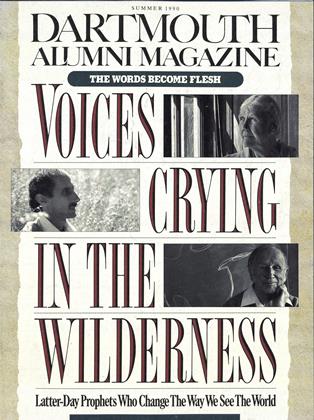Professor Emeritus EliseBoulding legitimizes the studyof war and its end.
IT IS ONE OF THE RAREST OF COMBINATIONS: a world-class scholar who has continually challenged the academy with the depth of her activism. In the company of theoreticians, her ground-breaking research has taken shape (the founding of the International Peace Research Association in 1965, the creation of War/Peace Studies at Dartmouth in 1984, the establishment of several national peace academies). Amid the heatgenerating factions of the peace movement, Elise Boulding teacher, innovator, nominee for the 1990 Nobel Peace Prize has produced light. She speaks not only from the human wilderness of hunger, poverty, disease, and violence but from that moral wilderness of educated beings who fail to use the resources to make a difference.
"It is not that hers is the only voice," says Leonard Rieser '44, who was dean of the faculty in 1979 when she was named professor and chair of Dartmouth's Sociology Department. "It's just that the intensity sets it far apart from the rest." Born in Norway in 1920, Elise Boulding has written, lectured, and relentlessly promoted her vision of a peaceful world for nearly four decades. "I was blessed being born with a high level of energy," she says. "And even in the worst possible situations, I've never lost the ability to visualize the other and the better."
While recent world events have led many to believe that peace is breaking out all over, Dr. Boulding looks at the redefining of nation-states and sees an increasingly precarious situation and an opportunity. "The work," she says, "is just beginning."
Contemplating the possibilitiesof peace, Elise Boulding helpedestablish a new field of research.
"It is anatmosphere thatis frighteningand can producetotal silence"he says ofthe averagecourtroom. "Wecannot expectchildren toperform asadults do."
 View Full Issue
View Full Issue
More From This Issue
-
 Cover Story
Cover StoryTHE FATHER OF CHAOS
June 1990 By Steve Lyons -
 Cover Story
Cover StoryTHE DOCTOR FOR THE SPIRIT
June 1990 By Elise Miller ’85 -
 Cover Story
Cover StoryTHE JUDGE WHO METES COMFORT
June 1990 By Jack Steinberg ’88 -
 Cover Story
Cover StoryTHE MEDICAL SYSTEM’S EMERGENCY SURGEON
June 1990 By Jay Heinrichs -
 Feature
FeatureJUNE IN HANOVER
June 1990 -
 Cover Story
Cover StoryVoices Crying In The Wilderness
June 1990 By The Editors
Jim Collins ’84
-
 Cover Story
Cover StoryCanoes Undying
Jul/Aug 2004 By JIM COLLINS ’84 -
 Cover Story
Cover Story100 Years of the Dartmouth Outing Club
Nov/Dec 2009 By Jim Collins ’84 -
 Feature
FeatureRising From the Ruins
Nov/Dec 2009 By JIM COLLINS ’84 -
 TRIBUTE
TRIBUTEFishing With George
May/June 2010 By Jim Collins ’84 -
 Article
ArticlePaddle Power
NOVEMBER | DECEMBER 2013 By Jim Collins ’84 -

The 25 Most Influential Alumni
JANUARY | FEBRUARY 2019 By Rick Beyer ’78, George M. Spencer, Jim Collins ’84, 3 more ...
Features
-
 Feature
FeatureGreen Derby Contests for 1938
April 1939 -
 Feature
FeatureEleven Professors to Retire
June 1960 -
 Feature
FeatureA NEW LOOK ON THE INN CORNER
APRIL 1968 -
 Feature
FeatureHANOVER SUMMER
September 1976 -
 Feature
FeatureArms Control in a Cold War
May 1961 By GENE M. LYONS -
 Feature
FeatureThe Actor Who Knew Too Much
July/August 2012 By TY BURR ’80



